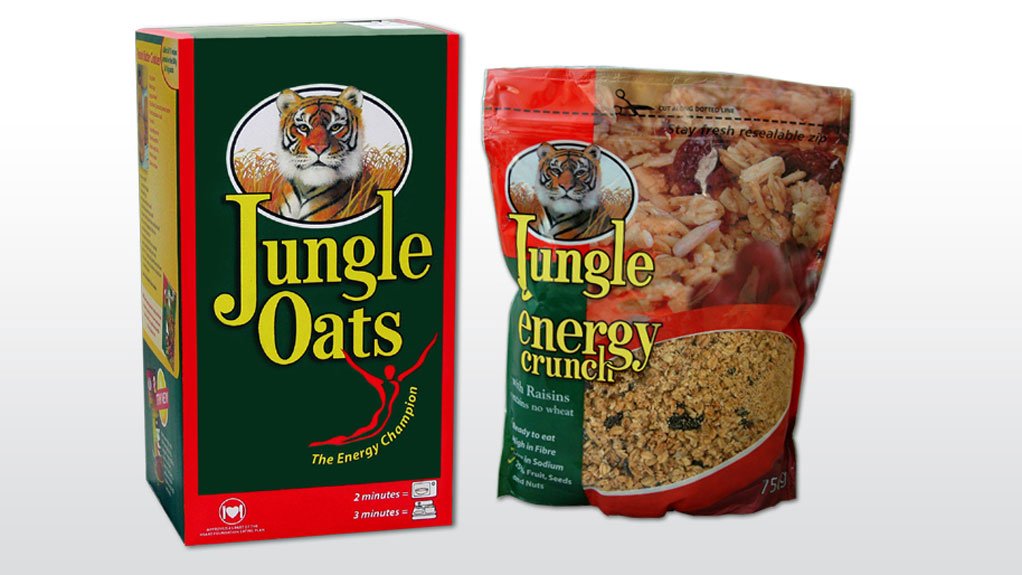Tiger Brands turnover increases 7%, but tough trading conditions persist
JSE-listed packaged goods company Tiger Brands has increased its turnover for the first quarter ended December 31, 2014, to R8.2-billion, a 7% increase compared with the corresponding period of the prior year, despite facing difficult times, which are expected to continue.
“There is nothing that is going to be easy in the short to medium term, however; we do think we are well positioned, given the discipline around costs and the investments we are making [with regard to] our brands, to continue to grow the business and take it forward,” CEO Peter Matlare said in a conference call on Tuesday.
In its latest trading update, the group noted that the focus on the strength of its brands remained paramount and the company would continue to improve this through careful price management, increased marketing support and new product innovation.
Matlare pointed out that Tiger Brands had seen “some nice volume growth and market share improvement” across several of its businesses and turbulence across one or two businesses – for example, its Nigerian business; a portfolio of businesses that, he noted, continued to wade through these difficult times.
However, tough trading conditions also persisted in South Africa – where consumers were not as buoyant, remaining under pressure and managing their manage budgets carefully – and in the balance of Africa.
“Volumes in the domestic businesses have moderated as the cumulative effect of price increases, taken over the past year to recover input cost pressures, have impacted on consumer offtake,” Tiger Brands noted, adding, however, that in South Africa, cost-saving initiatives implemented over the last few years continued to bear fruit and had, to an extent, mitigated the ongoing cost pressures resulting from the weaker rand.
The market shares of the company’s core brands remained resilient, although competitor activity generally remained intense throughout the business.
Further, bakery volumes for the quarter under review were negatively affected by a five-week strike in October and November, in KwaZulu-Natal.
Although, the food titan’s business executive for grains and Nigeria, Noel Doyle, explained that the strike was on top of “a very competitive environment” in terms of the pricing dynamics in the KwaZulu-Natal and Cape Town markets with the bulk of the impact on volumes relating to competitive pressures.
He added that the bakery division continued to operate during the strike, which involved the distribution staff, therefore, impacting on service levels and timeous delivery of product, as new drivers had been placed on the routes for the duration of the strike.
However, operating margins and profitability in the groceries business continued to improve and, while volumes and market shares in the home and personal care business remained strong, pricing activity was still intense and continued to weigh down the operating margins of this business.
Tiger Brands business executive for consumer brands Grattan Kirk explained that, with regard to the groceries business, the stock availability issues of last year were behind the company. So far, there had been reasonable manufacturing stability, but load shedding continued to be a risk. “We can only get full generating capacity by April, owing to the leadtime required and demand. However, this will give us full on-site functionality in terms of load shedding.”
NIGERIA
The outlook for 2015 remained especially challenging for Tiger Brands' Nigerian businesses.
In November the company announced that it had progressed turnaround initiatives at its flailing Nigerian subsidiary; however, Dangote Flour Mills (DFM) was only expected to break into positive financial territory two years from now.
Tiger Brands embarked on a turnaround plan that was reflecting quarterly improvements after DFM’s earnings plunged in the first half of the full year to September 30.
DFM had achieved positive volume momentum and operating leverage during the quarter under review, which Tiger Brands attributed to tight cost control and improved efficiencies in line with its turnaround plan. Its results, however, had been negatively affected by foreign exchange losses on its foreign currency borrowings following the recent devaluation of the Nigerian naira.
“The ongoing volatility and constrained liquidity in the Nigerian foreign exchange market have resulted in increased raw material input costs, which cannot be fully recovered in pricing owing to the competitive environment,” stated Tiger Brands.
The company expected the volatility to remain for the balance of the year, because of the collapse of the crude oil price, which Matlare said would have a significant impact on the Nigerian consumer, who would be under greater pressure than in recent times.
He further highlighted the political uncertainty relating to the postponement of Nigeria’s general election from February 14 by six weeks. During this time the country’s military would be launching an operation to secure the northeast from Boko Haram in a bid to ensure the safety of voters in the region.
“It would have been preferable for the election to have been held as originally anticipated because we [expect] that the Nigerian sociopolitical economy [would have settled] down somewhat sooner,” commented Matlare, noting that a decent level of performance and/or profitability from Nigeria was expected about 2016/17.
Tiger Brands warned that a further devaluation of the naira would impact negatively on the outlook of the DFM business for the balance of the year, although market pricing was expected to adjust in time, once stability was restored to the local currency market.
“The short-term prospects for the Nigerian businesses remained extremely challenging notwithstanding the positive operational momentum that the DFM business is starting to achieve,” advised Tiger Brands, which continued to stay focused on the long-term prospects of DFM.
The company’s current share price levels were forecast to negatively impact on the group’s IFRS 2 share option charge compared with the previous year.
Comments
Press Office
Announcements
What's On
Subscribe to improve your user experience...
Option 1 (equivalent of R125 a month):
Receive a weekly copy of Creamer Media's Engineering News & Mining Weekly magazine
(print copy for those in South Africa and e-magazine for those outside of South Africa)
Receive daily email newsletters
Access to full search results
Access archive of magazine back copies
Access to Projects in Progress
Access to ONE Research Report of your choice in PDF format
Option 2 (equivalent of R375 a month):
All benefits from Option 1
PLUS
Access to Creamer Media's Research Channel Africa for ALL Research Reports, in PDF format, on various industrial and mining sectors
including Electricity; Water; Energy Transition; Hydrogen; Roads, Rail and Ports; Coal; Gold; Platinum; Battery Metals; etc.
Already a subscriber?
Forgotten your password?
Receive weekly copy of Creamer Media's Engineering News & Mining Weekly magazine (print copy for those in South Africa and e-magazine for those outside of South Africa)
➕
Recieve daily email newsletters
➕
Access to full search results
➕
Access archive of magazine back copies
➕
Access to Projects in Progress
➕
Access to ONE Research Report of your choice in PDF format
RESEARCH CHANNEL AFRICA
R4500 (equivalent of R375 a month)
SUBSCRIBEAll benefits from Option 1
➕
Access to Creamer Media's Research Channel Africa for ALL Research Reports on various industrial and mining sectors, in PDF format, including on:
Electricity
➕
Water
➕
Energy Transition
➕
Hydrogen
➕
Roads, Rail and Ports
➕
Coal
➕
Gold
➕
Platinum
➕
Battery Metals
➕
etc.
Receive all benefits from Option 1 or Option 2 delivered to numerous people at your company
➕
Multiple User names and Passwords for simultaneous log-ins
➕
Intranet integration access to all in your organisation





















